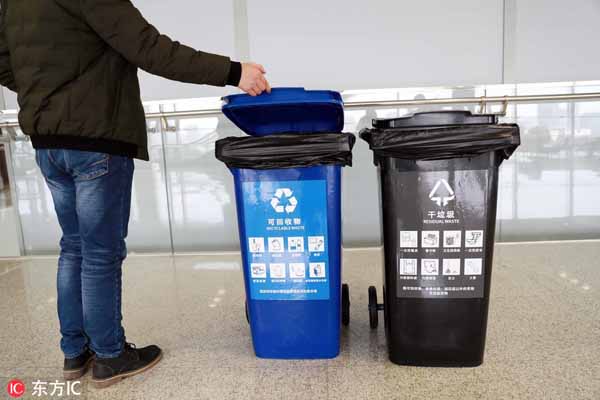 |
|
Waste sorting bins are set up in the rest area outside the Shanghai Municipal People's Congress venue at the Shanghai World Expo Exhibition and Convention Center on Jan 26, 2019. [Photo/IC] |
Shanghai's first regulation on domestic waste management will take effect on July 1 after being approved at the annual session of the municipal people's congress on Jan 31.
With some final changes made following the city congress deputies' review, the regulation was voted on the last day of the session, and was approved by a wide margin.
The full text of the regulation will be made public by Feb 15.
The regulation covers reducing the amount of garbage produced at source, ensuring separate transportation of different kinds of garbage, improving the waste treatment facilities and promoting social participation.
According to the regulation, if not requested by guests, hotels should not provide disposable slippers and shower caps, while restaurants and food delivery businesses should not provide disposable chopsticks and forks.
Government and public institutions are not allowed to use disposable cups in the office and should give priority in purchasing products made from recycled materials.
All the courier companies that operate in the city should use digital orders and environment friendly materials for packaging.
It requires people to sort household trash into four categories — dry garbage, wet garbage (kitchen waste), recyclables and hazardous waste — and individuals who fail to do so will be fined up to 200 yuan ($30). For companies and institutions, the fine can go up to 50,000 yuan. In addition, transport operators can refuse to pick up the trash if it's not properly sorted.
The waste transport should use special vehicles with clear labels, and separate transportation for different kinds of garbage.
For waste treatment companies, the regulation imposes strict requirements to ensure the treatment process won't contaminate the nearby water and soil, or cause air or noise pollution.
The regulation asks the government to create monitoring and supervision mechanism to ensure the enforcement, release related inspection results, and put waste management as one performance indicator for officials.
Shanghai, a city of more than 24 million residents, produces more than 9 million metric tons of domestic garbage every year, which poses a big threat to the city's environment and sustainable development.
Guangzhou, Beijing and Hangzhou of Zhejiang province have all passed similar regulations in recent years.

